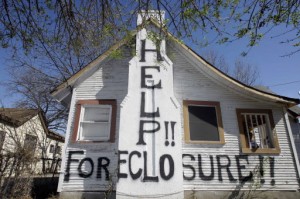
Foreclosures are posting substantial declines for 2011, but according to RealtyTrac, the numbers are not what they seem.
The latest foreclosure data from RealtyTrac would appear to be promising: the 205,000 foreclosures in December were the lowest monthly total since November 2007, the 1.8 million foreclosures for all of 2011 were a 35 percent decline from 2010 and bank seizures were down from 1.05 million in 2010 to 804,000 in 2011, the lowest level in four years.
Accompanying all that seemingly rosy data, though, is RealtyTrac and other’s interpretation of the data, which credit an increasingly languid foreclosure process and numerous processing issues for the low numbers, not an overall decrease in delinquent properties.
Brandon Moore, for instance, the new CEO of RealtyTrac, credited the decline to delays in processing.
“Foreclosures were in full delay mode in 2011, resulting in a dramatic drop in foreclosure activity for the year,” Moore said. “The lack of clarity regarding many of the documentation and legal issues plaguing the foreclosure industry means that we are continuing to see a highly dysfunctional foreclosure process that is inefficiently dealing with delinquent mortgages — particularly in states with a judicial foreclosure process.”
As HousingWire points out, a big source of the delays came in 2010, when mortgage servicers, in a frantic rush to foreclose on home’s, improperly filed documents and, allegedly, illegally neglected certain elements for the sake of time; those allegations are currently being played out in local courts, and as a result, pending foreclosures have been further delayed.
Another huge source for delays has been the varying judicial systems that states use to process the foreclosures, which has resulted in wildly different time frames depending on the state. For instance, New York, RealtyTrac’s number one city, takes 1,019, on average, to process and complete a foreclosure. It takes nearly 1,000 days in New Jersey, more than 800 in Florida and almost 600 in Illinois, Massachusetts and Pennsylvania.
Moore did say, though, that delays may not pose as big of a problem going forward, though it may result in a greater number of filings.
“There were strong signs in the second half of 2011 that lenders are finally beginning to push through some of the delayed foreclosures in select local markets,” Moore said. “We expect that trend to continue this year, boosting foreclosure activity for 2012 higher than it was in 2011, though still below the peak of 2010.”
